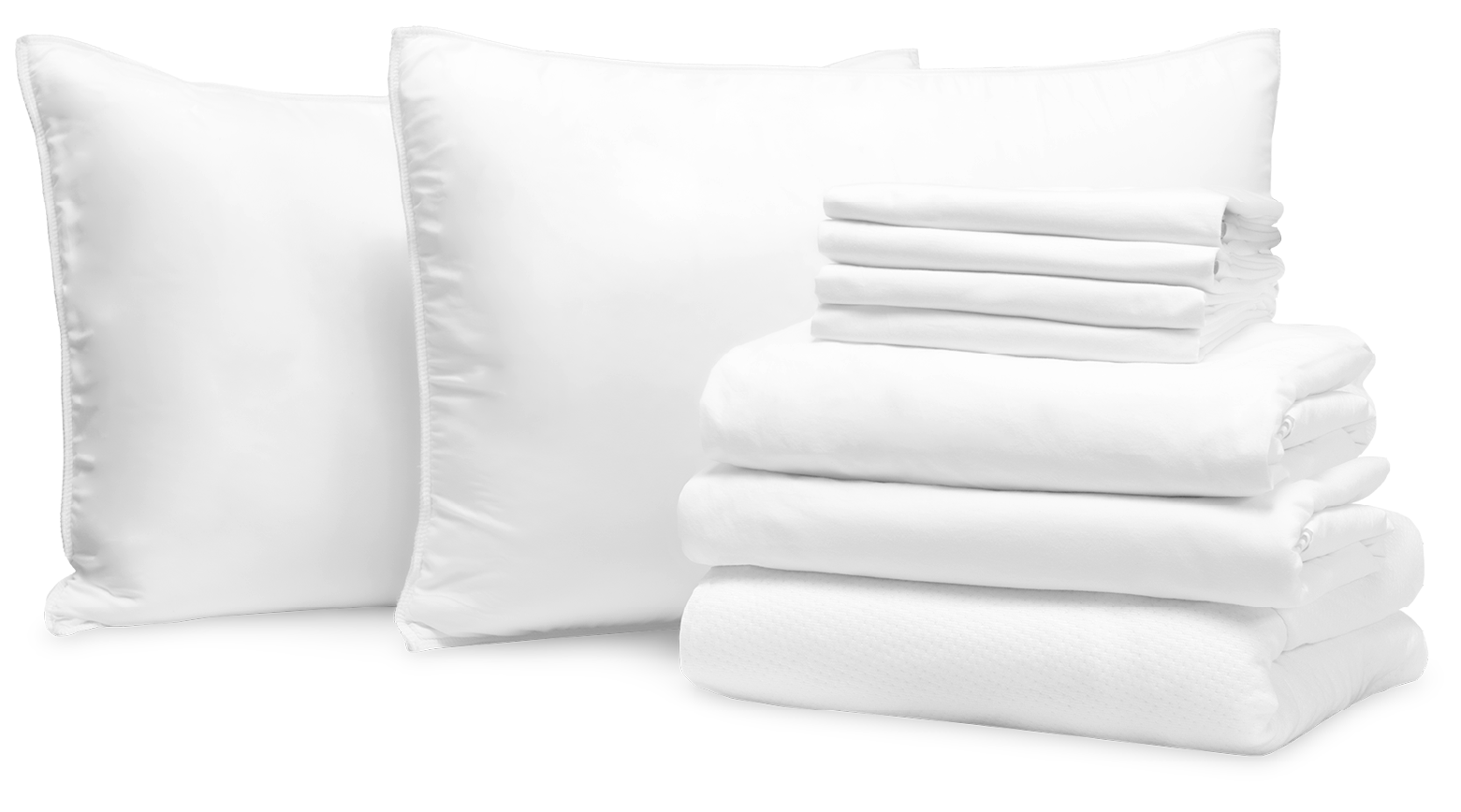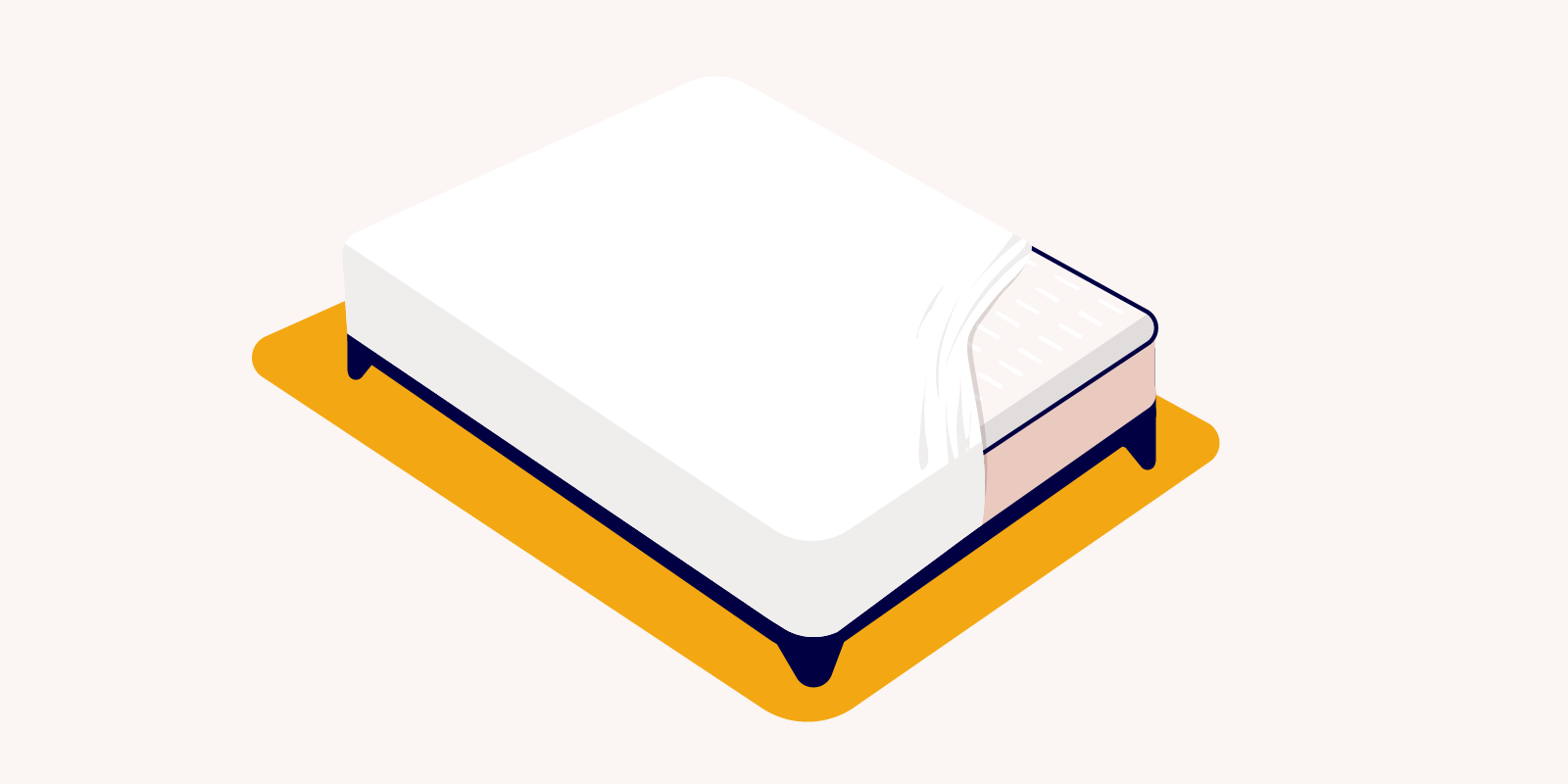How Often Should You Wash Your Sheets? (2025)
Updated: March 31, 2025 | Published: July 2, 2024Did you know you spend up to one-third of your life in bed? With so much time spent in this space, it’s essential to ensure that your sheets are clean and comfortable.
Whether you need to remove a stain, you’ve been sick recently, you have allergies or want to sleep well at night, keeping your sheets clean is one of the best things you can do for yourself and your bed. One of the easiest ways to achieve this is by washing your sheets regularly. But how often is “regularly“?
In this guide, we’ll examine how to wash your bedding and how often. We’ll also discuss why washing your bedding regularly is a good idea, what happens when you don’t wash your sheets enough (or too much), and how to wash other types of bedding.
When Should You Wash Your Sheets?
No matter what kind of sheets you have, you should wash them once a week, including your pillowcases. If you don’t use your bed every night, it’s possible to make that every two weeks. However, that gives stains and body oils the chance to linger.
Your sheets aren’t the only thing that need cleaning. Other parts of your bedding also need to be washed from time to time, but generally not as often as your sheets:
| Bedding Type | Recommended Washing Frequency |
|---|---|
Top Sheet + Fitted Sheet | Weekly |
Pillowcases | Weekly |
Pillow Protectors | Every 2–3 weeks |
Pillow Inserts | Every 2 months |
Mattress Protector | Every 2–4 months |
Weighted Blanket | Every 1–3 months |
Comforter | Every 1–3 months |
Comforter | Monthly if used with a top sheet (weekly if used without) |
Duvet Cover | Monthly if used with a top sheet (weekly if used without) |
Duvet Insert | Every 3–6 months |

How to Wash Your Bed Sheets
Bed sheets are almost always machine washable, but yours might require specific treatment depending on the material they’re made out of. Bamboo and cotton sheets, for instance, need to be handled differently when washing and drying. Follow these step-by-step instructions to wash your sheets.
DISCLAIMER: Always check the product tag and/or manufacturer’s website for tips on safely cleaning your bedding.
- Strip the sheets from your bed. You might need to move your bed frame or foundation to remove the fitted sheet. Take care to avoid damaging your floor, walls, and other furniture. Don’t forget to take off your pillowcases, too.
- Clean your sheets in your washing machine. Follow the instructions on the product label to avoid damaging your sheets. It may be possible to wash your sheets with other dirty laundry like towels or clothes, depending on what they’re made of. For best results, though, wash your sheets by themselves at the highest temperature they can tolerate. That way you’ll kill as many germs as possible.
- Dry your sheets. After washing your sheets, dry them in your dryer. You can also air-dry them on a line, either indoors or outside, as long as the space is well-ventilated and the sheets are laid flat on the line for proper airflow.
- Put your sheets back on your bed. Again, you may need to move your bed frame or foundation, especially when replacing the fitted sheet. Once your fitted sheet and top sheet are in place, lay your comforter or duvet flat overtop. Put your pillows back in their pillowcases before returning them to your bed.
READ MORE: Lyocell vs. cotton sheets: find out which is best for you.
Depending on the size of your mattress, your sheets might take up a significant amount of space in your washing machine and could take a long time to dry. If that’s the case, it’s a good idea to wash your sheets earlier in the day. That way they’ll be clean and dry for bedtime.
(Looking for something to do while your sheets are in the wash? Take the opportunity to clean your mattress, too.)

Why Should You Wash Your Sheets Regularly?
Keeping your sheets clean is a good idea for a lot of reasons—and most of them relate to your body and keeping it healthy. Washing your sheets regularly is a good idea because:
- Every minute, adults naturally shed 30,000–40,000 dead skin cells. That works out to around 1.8–2.4 million cells shed over the course of just one hour. It’s no surprise that a lot of them find their way into your bed.
- Your sheets collect more than just dead skin. Sweat (including salt), body oils, and bacteria also accumulate in your bedding. These can have some pretty serious consequences for your skin and your lungs if you leave your sheets unwashed for too long.
- It helps your bed last longer. Your mattress and your bedding work together to help each other avoid wear and tear. Keeping your sheets clean is one of the simplest, best ways to ensure that both your sheets and mattress last many years.
READ MORE: How long should a mattress last?
Reasons You Should Wash Your Sheets More Often
Although it’s a good idea to wash your sheets regularly, sometimes that isn’t enough to keep your bedding as clean as it could be. You should wash your sheets more frequently if:
- You have allergies or have been sick recently. Keeping your sheets clean gets rid of leftover bacteria and dead cellular material, and prevents germs from developing. It also gets rid of pollen, dust, and other allergens. This helps you recover from serious illness faster and can help prevent you from getting sick again.
- You sweat a lot while sleeping. If you’re a warmer sleeper, chances are good that you also sweat more, since your body has to work harder to keep you cool. Sweat contains salt and bacteria, which your bedding absorbs easily. A salty sleep is not a comfortable or healthy one. Clean sheets can help with that.
- You don’t bathe before bed, or bathe less often. While a morning shower refreshes you for the day, showering at night reduces the dead skin cells, oils, and bacteria transferred to your sheets. Wash your bedding often to keep it fresh and clean.
- You don’t remove your makeup before bed. Sometimes, it’s just too much trouble to wash your face before going to sleep. But your makeup will stain your bedding, especially your pillowcases. Makeup stains that are allowed to remain can be difficult to get rid of, even with stain remover, so wash your sheets right away.
- You like to eat while in bed. Listen, we love snacking in bed as much as the next person. But crumbs can cause stains and attract insects. If you’re going to eat in bed, we recommend cleaning your sheets more often to avoid unwanted guests.
- You share your bed with more than one person. Two people sleeping in the same bed means twice the amount of dead skin cells, sweat, and body oil. And when it comes to young children, there’s always the chance for an accident. Washing your sheets regularly keeps your bed fresh—for your sake, and theirs.
- You share your bed with pets. However well-groomed they may be, pets still leave their mark on your bedding. Fur, allergens, odours, and fluids make their way onto your sheets overnight. Frequently washed bedding keeps messes to a minimum and lets you comfortably share a bed with your four-legged friends.

What Happens If You Don’t Wash Your Sheets Regularly?
Like any chore, laundry isn’t always fun to do. But delaying washing your sheets can have consequences for your bed and your personal health. In addition to getting a poorer-quality sleep, you also risk:
- Mattress damage: Your body’s salt, oil, and skin cells don’t improve your bed with age. They can break down even the most durable sheets and cause them to degrade, wrinkle, and fray. They can also damage your mattress and drastically shorten its lifespan.
- Mould growth: Mould grows from fungal spores, and unwashed sheets are the perfect place for those spores to grow. Mould damages your bed, and the spores and mycotoxins it creates can lead to some serious health consequences, ranging from a mould allergy to severe neurological issues.
- Dust mites: These insect-like pests are too small to see with the naked eye, but they can cause severe allergic reactions and worsen asthma symptoms. Dust mites eat skin cells left in unwashed sheets, and they can breed extremely quickly. In fact, a bed can have up to 10 million dust mites at any given time.
- Pests: Unwashed food or beverage stains can attract insects and even rodents to your bed. Keeping your sheets clean prevents you from waking up in the middle of the night to discover an unwanted bedmate cozying up to you.
- Acne. When you sleep in sheets that have absorbed a lot of your body’s natural oils, it doesn’t do great things for your skin. This makes it much more difficult for your body’s pores to flush themselves clear, which can cause acne. The longer you wait to wash your sheets—especially your pillowcases—the worse your acne can get.
- Diseases: When your body’s fighting off pathogens in your unwashed bedding, it puts strain on your immune system. This makes it more likely that you’ll get sick. It also might take you longer to get better if you’re sick already, which is a problem if you’re recovering in bed.
What Happens If You Wash Your Sheets Too Often?
Washing your sheets regularly is a great idea. But it’s also possible to wash your sheets too often. This can cause permanent damage like:
- Warping the fibers in your sheets, leading to wrinkles that no amount of ironing will remove
- Stretching your sheets and damaging their elastics, which can affect the way they fit your bed
- Fraying your sheets and reducing their durability, leading to rips and tears
- Pilling your sheets, which occurs when frayed threads bunch up into clusters that gather lint and other loose material
We understand that you want to make your sheets last as long as possible. There are other ways to do that, like not eating and drinking in bed, minimizing your pets’ contact with your sheets, and avoiding anything that can damage your bedding (like metal objects or even sharp fingernails).
As long as you’re careful with your sheets, they should last you several years of nightly use.
READ MORE: Linen vs. cotton sheets: find out which is best for you.
How Often to Wash Other Bedding
While sheets should be washed on a weekly basis, other types of bedding can wait a little longer. Here’s how often you should wash your bedding—and how to do it:
Pillow Protectors
Wash pillow protectors every 2–3 weeks with cold water on a gentle cycle, then air-dry or tumble-dry. If your pillow protectors aren’t machine washable, put a few drops of liquid detergent in cold water and rub the mixture over the exterior with your hands.
Pillow Inserts
Wash pillow inserts every 2 months using warm (not hot) water on a gentle cycle. They should be washed alone. If you have a top-loading washer, place the inserts on opposite sides of the machine to balance the load. Dry on low heat, or allow to air dry for several hours. Different types of pillows may require different care requirements, so it is always best to check the manufacturer’s care guide.
Mattress Protectors
Wash your mattress protector every 2–4 months on its own with cold water using a gentle cycle. Tumble-dry on low heat, or air-dry for several hours. Some mattress protectors can’t be machine washed and can only be spot-cleaned with water and a light detergent.
READ MORE: How to wash a mattress protector
Weighted Blankets
Wash weighted blankets every 1–3 months on their own with cold water and mild detergent. Balance the load before washing, even with a front-loading washing machine, then air-dry the blanket. If your blanket weighs over 15 lb, it may be too heavy and will need to be dry-cleaned.
Comforter
Wash your comforter monthly if you use a top sheet, or weekly if you don’t. A comforter should be washed on its own using cold water and a gentle cycle. Depending on the material, you may be able to tumble-dry your comforter on low heat, but the safer option is to air-dry it.
Duvet Cover
Wash your duvet cover monthly if you use a top sheet, or weekly if you don’t. We recommend washing it by itself for best results. Use cold or warm water on a gentle cycle, and tumble-dry on low heat or air-dry when finished. Avoid tumble-drying for too long, as this can cause wrinkling.
READ MORE: How to put on a duvet cover by yourself
Duvet Insert
Wash your duvet insert every 3–6 months on its own using cold water on a gentle cycle. Because duvet inserts are dense and highly absorbent, they should be rinsed twice. Duvet inserts should never be tumble dried, so air-dry yours for several hours instead.
Our goal is to provide the information you need to find the mattress that’s right for you. Get started with some of our most popular mattress shopping resources:
- Best Mattress Guides: Best Mattress Canada, Best Mattress In a Box
- Reviews: Douglas Original, Logan & Cove Choice, Juno, Octave Vista
- Comparisons: Douglas vs Endy, Douglas vs Casper
We use independent, third-party engineering firms (commissioned by us) with the APEGA stamp of approval to conduct mattress testing on our behalf, using publicly available data. We review and test all mattresses on 40+ criteria we think are important to you, including price, country of manufacture, sleep trial, warranty, features, materials used, motion isolation and edge support ratings, customer satisfaction reviews, returns, and refunds.






